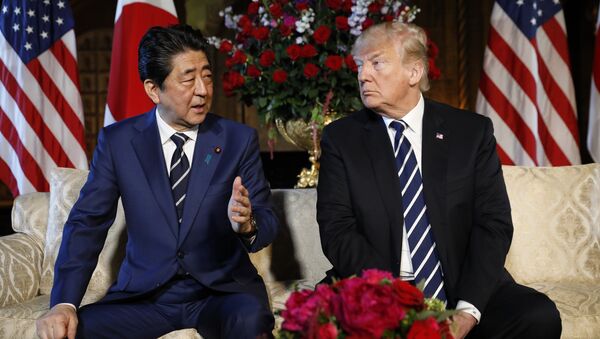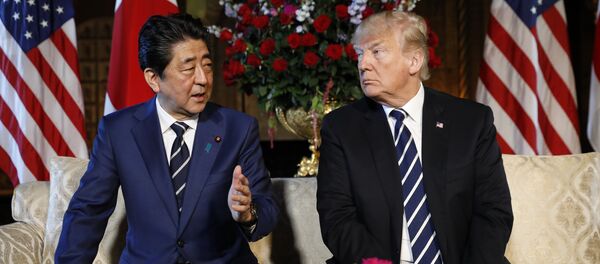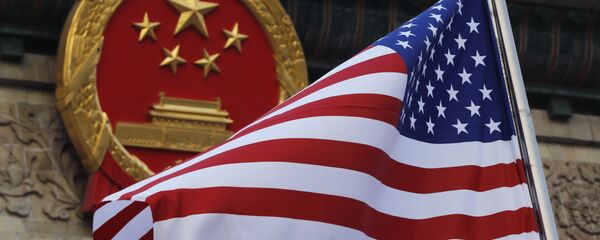While China and Japan attach great importance to the improvement of bilateral relations, the US is not interested in a Sino-Japanese thaw, Zhou Yongsheng, a research fellow with the Center for International Relations Studies at the Diplomatic Academy of China, told Sputnik.
"The US does not want a major improvement in Sino-Japanese relations," Zhou noted in an interview with Sputnik China. "The United States regards Japan as a deterrence tool against China. Recently, Japan, indeed, has become the US foothold in East Asia to counter China. At the same time, Japan… avoided extremes in its relations with China, realizing that this could have a boomerang impact on its own interests, especially in case of improvement in Sino-US relations. [Recently] a feeling has emerged in Japan that the Americans could leave it out in the cold."
The latest visit of Chinese State Councilor and Foreign Minister Wang Yi to Japan on April 15-17 marked a potential thaw in relations between Beijing and Tokyo. On April 16, Wang took part in the fourth high-level economic dialogue with Japanese counterpart Taro Kono after an eight-year break.
The sides signaled their commitment to the principles of free trade and globalization, agreed to cooperate within the framework of the China-led Belt and Road, facilitate the conclusion of the China-Japan-South Korea free trade agreement and push ahead with the Regional Comprehensive Economic Partnership (RCEP), a viable alternative to the Trans-Pacific Partnership (TPP) project that was de facto quitted by the Trump administration in January 2017.
However, Valery Kistanov, a researcher at the Institute of the Far East in Moscow warned against excessive euphoria over the current Sino-Japanese rapprochement.
"One should not overestimate the possibility of sharp improvement in relations between Japan and China, because there are very serious contradictions [between the countries] including a territorial dispute, [different] views on history and Japanese aggression against China. These factors have not gone away," Kistanov pointed out.
Second, Trump announced that Tokyo should make concessions to the US in the sphere of trade due to the American trade deficit with the country amounting to $70 billion. Furthermore, Japan was subjected to Trump's additional trade tariffs on steel and aluminum.
"Therefore, Japan has turned to China to solve its economic problems," Kistanov said. "For its part, China is also interested in rapprochement with Japan to resist together Trump's offensive in a trade war."
The basic contradictions between Japan and China once again emerged a week ago, when Japan activated its new 1,500 man Amphibious Rapid Deployment Brigade — the first amphibious unit since the Second World War. However, it was announced on April 17, that the Japanese military would hold a meeting with their counterparts from the People's Liberation Army (PLA) to build trust between the opponents.
Kistanov echoes the Chinese scholar by saying that "in general, the US is not interested in improving relations between Japan and China."
"For many decades Washington has followed an old 'divide and conquer' principle," the Russian researcher noted. "Sino-Japanese tensions play into Washington's hands. On the one hand, it provides the US with an opportunity to use Japan as a platform for economic, political and military deterrent against China's rise. On the other hand, the maintenance of anti-China sentiment in Japan would allow Washington to manipulate [Tokyo] into serving American interests. In this case Japan would remain a more reliable partner in the eyes of the US rather than in the context of its rapprochement with China."
On April 16, while commenting on Wang's visit to Japan, Chinese Foreign Ministry spokeswoman Hua Chunying expressed hope that the "two sides can maintain communication and make concerted efforts to create conditions for the high-level exchanges going forward and the steady improvement and development of China-Japan relations."
"The China-Japan relations are witnessing the momentum of improvement," she said. "State Councilor and Foreign Minister Wang Yi's visit to Japan upon invitation is a response to the positive policies towards China adopted by Japan over a period of time."
The views and opinions expressed by the speakers do not necessarily reflect those of Sputnik.





